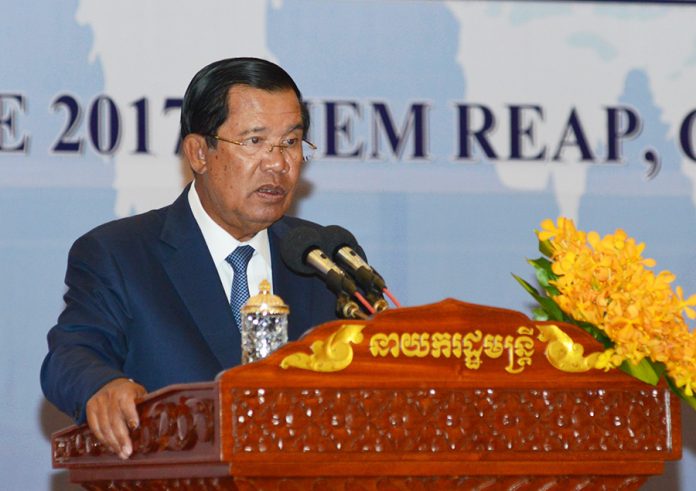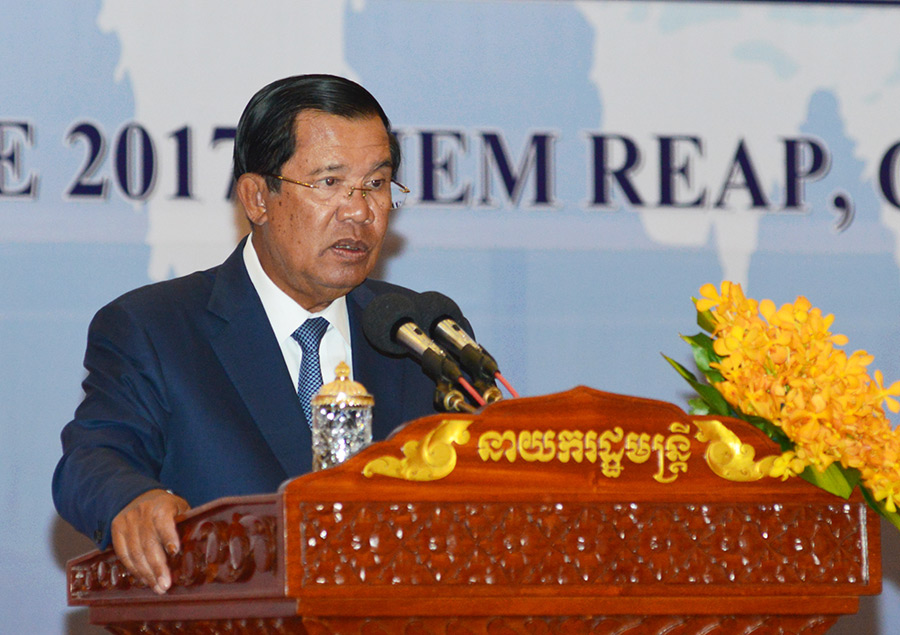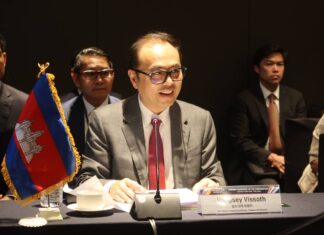Excellencies Ministers and Heads of Delegations from all Member States of Asia Cooperation Dialogue (ACD),
Excellency Ms. Anne Lemaistre, UNESCO Representative in Cambodia,
Excellency Mr. Shanzhong Zhu, Executive Director of UNWTO
Distinguished National and International Guests, Ladies and Gentlemen!
Today, I have a great pleasure to attend the Opening of the 2nd Asia Cooperation Dialogue (ACD) Ministerial Meeting on Tourism and the 1stUNESCO and World Tourism Organization (UNWTO) International Conference on Sustainable Tourism and Heritage Cities under the topic of “Protection and Conservation of Heritage Cities” at this moment. This meeting and international conference is the important platform for discussion and experience exchange among national and international institutions, experts and researchers to put forward new measures and goals for diversifying tourism products and guiding sustainable development of heritage and cultural tourism in Cambodia as well as other member states of Asia Cooperation Dialogue and the world as a whole.
Taking this opportunity, I would like to express my appreciation to ACD Secretariat, UNESCO, UNWTO, Pacific Asia Travel Association (PATA)and University of Sunshine Coast, Australia for the close collaboration with the Royal Government of Cambodia to organize this meeting and international conference at this City of Angkor, which is the world famous heritage. At the same time, I would like to warmly welcome the presence of Her Excellency, Vice President of Iran, Excellencies Ministers, Deputy Ministers, Ladies and Gentlemen, Delegates of tourism and culture from countries around to this important meeting.
In fact, the tourism sector is a socio-economic sector that contributes to economic growth, job creation, poverty reduction, effective reduction of global warming as well as regional integration. In particular, the number of world tourists reached 1,235 million in 2016, an increase of 4.4% compared to 2015. ASEAN received around 116 million tourists, an increase of 6.5% during the same period while the upcoming years will see further increase. In this regard, in order to respond to the increasing demand of tourism, countries of each region must work closely together to strengthen and expand the markets while tourism products and services must be diversified and developed sustainably and responsibly.
Cambodia has paid great attention to the tourism sector while successfully securing peace, political stability, security, and social order. Thanks to this effort, Cambodia received around 5 international tourists in 2016, an increase of 5% compared to 2015 which help inject USD 3 billion into the economy. The figure of international tourists visiting Cambodia is predicted to reach 5.5 million in 2017, and by 2020 the figure will reach 7 million which generate USD 5 billion in revenue and 800,000 jobs.
In addition, Cambodia has clearly positioned itself as the very attractive destination of cultural and natural tourism that include Angkor region, intangible cultural heritage, beautiful coastal areas, the greenness and nature, and the friendliness of Cambodian people, etc. Cambodia is proud to present itself to the world as the Kingdom of Culture. In this sense, linking tourism with culture requires two parallel factors that include enhanced competitiveness of the cultural tourism destinations and assurance of sustainability of the development of cultural tourism sector.
In this spirit, Cambodia fully supports the selected topic of “Conservation and Protection of Heritage Cities” that focuses on: (1) exploring opportunities and challenges with the aim to promote strategic partnership and collaboration on tourism and cultural sectors, and to expand institutional linkage among ACD member states, (2) discussing new partnership models and the role of good governance in management, protection, conservation and development of heritage cities sustainably;
[Start of Comments]
Let’s Conserve and Develop Altogether
On this point, I should say one small thing to the Ministry of Culture and Fines Arts, the Ministry of Tourism, as well as UNESCO. I would suggest that (in any decision to make about conserving the cities) there should not be one that is either too extreme to the left or to the right. I have come across so many of this issue before. In Phnom Penh, there was an attempt at one stage to keep hundreds of old home. People (who owned the house) were unhappy about it. I visited those houses and they were in bad shape. People who owned the houses wished to rebuild it their ways. It was because of that reason that at one point, and I said it frankly here, I told the Phnom Penh mayor to suggest to UNESCO to purchase those homes. It is important to come up with a plan on houses, and their locations to keep. There must be a clear plan. Take for instance, some of the buildings left from the previous time and used as state office buildings. We must protect them. However, we cannot put the whole city under conservative plan without paying attention to development. While focusing on conservatism, we must also keep development in mind, and vice versa. Let us not allow conservative work hinder our development.
[End of Comments]
And (3) introducing decisions and statements in order to promote sustainable development of tourism and cultural sectors.
With this, I would also like to recall the commitment of the UNWTO and UNESCO World Conference on 4-5 February 2015 in Siem Reap, which issued the Siem Reap declaration on Cultural and Tourism under the topic of New Partnership Establishment by emphasizing on promoting relationships between people and people, and on supporting sustainable tourism development. Furthermore, Cambodia fully supports the “One Belt One Road” initiative which is China’s win-win policy framework that covers on The Silk Road Economic Belt and the 21st-century Maritime Silk Road because we believe that this great policy will help promote the development of tourism sector in countries located along the Silk Roadincluding Cambodia as well as the ACD member states.
Once again, I believe that all participants will share knowledge, skills, and experiences in the lively discussion session and the meeting will come up with statement and decision on “Sustainable Tourism and Heritage Cities” supported by UNESCO and UNWTO in order to jointly build the sustainable future for Tourism and Cultural Sector.
Finally, along with the opening of the 2nd Asia Cooperation Dialogue (ACD) Ministerial Meeting on Tourism and the 1st International Conference on Sustainable Tourism and Heritage Cities, at this moment, I would like to wish all participants happiness, success, and prosperity, and fruitful result of the meeting for the benefit of all member states of the Asia Cooperation Dialogue./.






![Facebook Message on the Conclusion of the “Border Infrastructure Fund with a focus on the construction of the border ring road” [Unofficial Translation]](https://pressocm.gov.kh/wp-content/uploads/2024/11/HUN-MANET-01-100x70.jpg)
![Selected Comments of Samdech Techo HUN SEN. President of the Senate, at the solidarity dinner with the Cambodian performance artists football team and the Khmer martial arts team [Unofficial translations]](https://pressocm.gov.kh/wp-content/uploads/2024/11/photo_2024-11-12_11-00-16-100x70.jpg)
